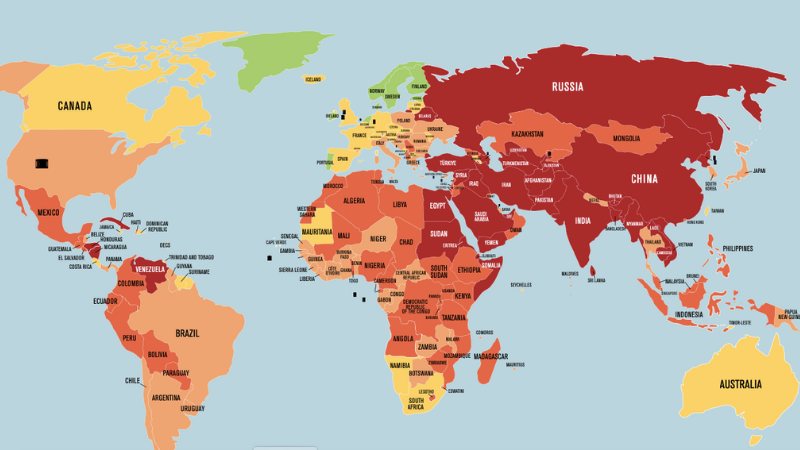The latest World Press Freedom Index report by Reporters without Borders (RSF) shows a sharp deterioration in press freedom globally. This has resulted in problematic European countries like Malta, Hungary, and Greece climbing up the list even as their press freedom concerns remain unaddressed.
Malta’s Press Freedom Index ranking has increased by 11 places this year and now ranks 73 compared to 84 last year. However, according to the report, this improvement has less to do with advancements in the country’s media landscape and more with a severe decline in many other regions worldwide.
This may explain why other problematic EU countries have also boosted their press freedom rankings. Hungary, for example, is now ranked 67, compared to 72 last year, and Greece is now ranked 88, compared to 107 in 2023, climbing up a whopping 19 places.
The ‘Orbanisation’ of the EU
According to the RSF’s regional analysis, despite the European Union’s adoption of its first media freedom law, the European Media Freedom Act (EMFA), and the fact that three European countries – Norway, Denmark, and Sweden – still top the index, European politicians have not stopped trying “to reduce the space for independent journalism”.
Those at the forefront of this dangerous trend include Hungary’s pro-Kremlin prime minister, Viktor Orban, and his counterpart in Slovakia (ranked 29), Robert Fico, who was quick to reverse the gains Slovakia had made following the assassination of Ján Kuciak and his fiancée Martina Kušnírová.
The RSF report describes how press freedom is continuously tested by the ruling parties in Hungary (67), Malta (73), and Greece (88), the EU’s three worst-ranked countries.
“Malta remains second to last in the EU; the island’s progress by 11 places in the World Press Freedom Index can be attributed mainly to the deterioration of the situation in other countries,” RSF Head of the EU-Balkans Desk Pavol Szalai said in a statement.
He added that “the recommendations resulting from the public inquiry into the assassination of Daphne Caruana Galizia have not been implemented, while full justice has still not been served in this key case for the fight against impunity in Europe. The ruling majority has addressed neither the issues related to independence and sustainability of the media nor to access to information and protection against SLAPPs.”
“The media landscape continues to be deeply polarised. However, the recently adopted European Media Freedom Act brings hope for improvement even in Malta,” Szalai concluded.
Malta’s press freedom credentials – a refresher
In 2022, Malta’s government appointed a Media Experts Committee to guide the implementation of 12 legislative proposals to safeguard press freedom as recommended by the board of the public inquiry into Caruana Galizia’s assassination.
The committee submitted its second report last July but was only tabled in parliament on 2 October and has yet to be discussed.
Prime Minister Robert Abela announced that he would publish a White Paper with proposed media laws, but nothing has happened.
Meanwhile, the independence of Malta’s public broadcaster continues to be all but eroded, access to information in the public interest remains severely limited, and several media organisations are becoming increasingly reliant on arbitrary government funding to survive.
Malta was also one of the countries that wanted to allow legal surveillance of journalists in the European Media Freedom Act (EMFA).
“Malta’s new ranking on the global index cannot be read as evidence of an improved media freedom situation. Malta ranks second to last in Europe, beaten to the bottom place only by Greece, and positioned even lower than Hungary, which has severe press freedom problems,” said Corinne Vella from the Daphne Caruana Galizia Foundation.
She added: “Three years after the public inquiry into Daphne’s assassination, the recommendations have not been implemented. That includes most of GRECO’s recommendations, as the most recent evaluation report shows. Accessing information from public authorities remains challenging, with FOI requests taking years and ministers routinely ignoring journalists’ questions and interview requests.
There’s an urgent need to protect independent journalism and to reduce the government’s influence in the media landscape.”
A global decline
According to the 2024 World Press Freedom Index report, press freedom worldwide is threatened by political authorities failing to protect journalism.
At an international level, this year is notable for a clear lack of political will on the part of the international community to enforce the principles of protection of journalists, especially UN Security Council Resolution 2222.
The war in Gaza has been marked by a record number of violations against journalists and media since October 2023. More than 100 Palestinian reporters have been killed by the Israel Defence Forces, including at least 22 in the course of their work.
The report further highlights several countries that have seen a significant deterioration in press freedom: Afghanistan has persecuted journalists incessantly since the Taliban regained control, plummeting 44 places in the political ranking.
Syria and Eritrea have also seen sharp declines, with Eritrea now ranked last in both political and general rankings, with record numbers of journalists detained, disappeared, or held hostage.
In Eastern Europe and Central Asia, media censorship has intensified, with Belarus, Georgia, Kyrgyzstan, and Azerbaijan mimicking Russia’s repressive methods. At the same time, Kremlin influence has also reached Serbia (NU), where pro-government media carries Russian propaganda.
Additionally, the report found that political groups often serve as channels for disseminating or instigating disinformation campaigns.
In more than three-quarters of the countries evaluated in the Index (138 out of 180 countries and territories), most of the questionnaire respondents reported that political actors in their countries were often involved in propaganda or disinformation campaigns. This involvement was described as “systematic” in 31 countries.














